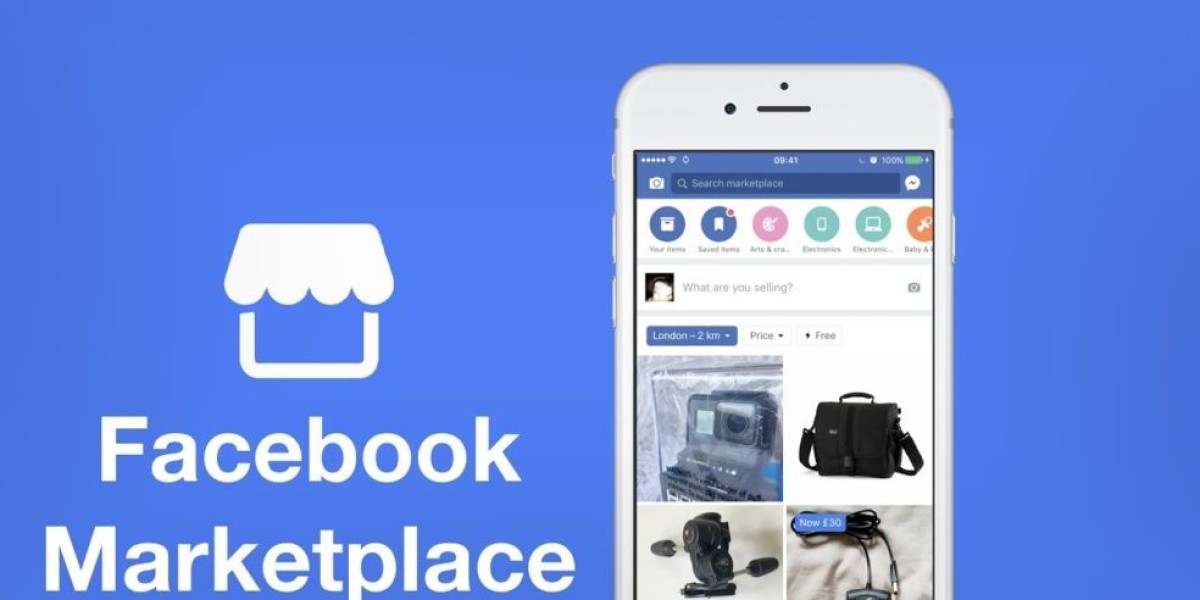Facebook Marketplace, since its inception, has rapidly emerged as a significant player in the e-commerce sector. What began as a simple platform for local communities to buy and sell items has transformed into a global trading hub, connecting millions of buyers and sellers daily. This evolution is particularly noteworthy given the already saturated online shopping space, with giants like Amazon and eBay dominating for years.
The allure of Facebook Marketplace lies in its seamless integration with the broader Facebook ecosystem. Users don't need to create new accounts or download separate apps; they can transition from chatting with friends to browsing listings with a single click. This convenience, combined with the platform's user-friendly interface, has made it a preferred choice for many, especially those new to online buying and selling.
Moreover, the Marketplace has reshaped buying and selling dynamics in several ways. For sellers, it offers a cost-effective platform to reach potential customers, both locally and globally. For buyers, it provides a diverse range of products, often with the added benefit of checking seller credibility through mutual connections or reviews.
The interpersonal aspect of transactions, facilitated by direct messaging, also sets it apart from more impersonal e-commerce platforms. In essence, Facebook Marketplace has successfully merged social networking with e-commerce, creating a unique and dynamic trading environment.
Advantages for Buyers
One of the standout features of Facebook Marketplace for buyers is its Seamless Integration. Unlike other e-commerce platforms that require users to juggle multiple accounts or apps, Facebook Marketplace is conveniently nested within the main Facebook app and website. This means that users can effortlessly switch from checking their news feed or chatting with friends to browsing items for sale. The familiar interface reduces the learning curve, making the shopping experience intuitive and straightforward.
Another significant advantage is the Diverse Listings available on the platform. Whether you're looking for vintage furniture, electronics, fashion items, or even real estate, the Marketplace offers a plethora of choices. The listings are not just limited to local sellers; with the platform's expansion, buyers can now access products from sellers in different cities or even countries. This diversity ensures that buyers have a broad spectrum of options, catering to various tastes and budgets.
Direct Communication with sellers is another feature that sets the Marketplace apart. Instead of going through tedious customer service channels or automated responses, buyers can directly message sellers. This facilitates quick inquiries, price negotiations, and even discussions about the product's history or condition. The immediacy of this communication streamlines the buying process and often leads to more transparent and satisfactory transactions.
Lastly, the User Reviews system is a boon for buyers. In an online space where trust is paramount, being able to gauge a seller's credibility is crucial. Feedback and ratings provided by previous buyers offer insights into the seller's reliability, product quality, and overall behavior. A seller with consistently high ratings and positive reviews is likely to be trustworthy, while multiple negative comments can serve as a warning. This review system empowers buyers to make informed decisions, reducing the risk of scams or unsatisfactory purchases.
Disadvantages for Buyers
While Facebook Marketplace offers numerous benefits for buyers, it's not without its drawbacks. One of the primary concerns is the risk of Potential Scams. Given the open nature of the platform, it's possible to encounter counterfeit products or dishonest sellers. For instance, a seller might list a branded item at a significantly reduced price, only for the buyer to discover it's a knock-off upon receipt. Similarly, there are instances where sellers might not deliver the purchased item at all after receiving payment. While Facebook has mechanisms to report and ban such users, the onus largely falls on buyers to be vigilant and discerning.
Another significant limitation is the No Purchase Protection policy. Unlike other e-commerce platforms that offer buyer protection or money-back guarantees, Facebook Marketplace operates more as a facilitator of buyer-seller interactions rather than a mediator. If a transaction goes south, buyers might find themselves with limited recourse. The platform doesn't have a formal dispute resolution system in place, which means buyers might have to handle disagreements or issues directly with sellers, which can sometimes be challenging and unsatisfactory.
Lastly, the sheer volume of listings can lead to Overwhelming Choices for buyers. With countless products being added daily, sifting through the vast array of options to find the desired item can be daunting. While filters and search functionalities do exist, they might not always narrow down choices effectively, especially if buyers are unsure of what they're looking for. This abundance, while a testament to the platform's popularity, can sometimes make the shopping experience tedious and time-consuming.
Advantages for Sellers
Selling on Facebook Marketplace comes with a set of unique advantages that can significantly benefit sellers. One of the most prominent benefits is the Huge Audience that the platform offers. With billions of active users, Facebook is undeniably one of the largest social media platforms globally. This vast user base translates to a plethora of potential customers for sellers. Whether it's a niche product or something with mass appeal, the chances of finding interested buyers on Facebook Marketplace are considerably high.
Another significant advantage for sellers is the Zero Listing Fees. Unlike many e-commerce platforms that charge fees for listing products or take a cut from the sales, Facebook Marketplace allows sellers to list their items for free. This cost-effective nature of the platform makes it especially appealing for small businesses or individual sellers who might not have a substantial budget for online selling. The absence of listing fees means that sellers can price their products more competitively, potentially leading to quicker sales.
The Local and Global Reach of Facebook Marketplace is another noteworthy advantage. Sellers can start by targeting their local community, making it easier for in-person transactions and building a local customer base. However, as they grow, they also have the option to expand their reach to broader markets, catering to buyers from different cities or even countries. This flexibility allows sellers to scale their business according to their capabilities and ambitions.
Lastly, the Social Media Advantage is a unique feature that sellers can leverage on Facebook Marketplace. Since the platform is integrated with the main Facebook app, sellers can easily share their listings on their personal profiles, groups, or pages. This means that apart from the regular audience on Marketplace, sellers can tap into their own network of friends, family, and followers, amplifying the visibility of their products. Such social sharing can lead to word-of-mouth marketing, referrals, and potentially higher sales.
Disadvantages for Sellers
While Facebook Marketplace offers a plethora of advantages for sellers, it's essential to be aware of the challenges that come with using the platform.
A primary concern for many sellers is the Fierce Competition. Given the platform's popularity and ease of use, countless sellers list their products daily. This influx means that sellers are vying for the attention of potential buyers in a saturated market. Whether it's a common product like electronics or niche handmade crafts, there's likely another seller (or several) offering something similar. Standing out and ensuring that one's listings capture the attention of potential buyers can be a daunting task. This competition can sometimes lead to price wars, where sellers continuously undercut each other, potentially affecting profitability.
Another challenge is the Payment Challenges. While the platform facilitates the listing and communication aspects of a sale, the payment process is largely left to the discretion of the buyer and seller. This lack of a standardized payment system means sellers have to navigate various payment methods, each with its own set of risks. For instance, while electronic transfers might seem convenient, there's always the risk of chargebacks or fraudulent transactions. On the other hand, cash transactions, especially for high-value items, come with their own set of security concerns.
Lastly, the Communication Overload can be overwhelming, especially for popular listings or sellers with multiple products. The platform's direct messaging system, while beneficial for real-time negotiations, can lead to a barrage of inquiries, offers, and questions. Managing these communications, especially if some of them don't lead to actual sales, can be time-consuming. Additionally, sellers need to maintain a high level of responsiveness to maintain a good reputation, which can be taxing, especially for individual sellers or small businesses without dedicated customer service resources.
In essence, while Facebook Marketplace offers a lucrative platform for selling, it's essential for sellers to be aware of these challenges and strategize accordingly to maximize their success.
What are the disadvantages of Facebook Marketplace?
Facebook Marketplace, while convenient, has challenges such as potential scams, fierce competition among sellers, lack of a standardized payment system, and the possibility of communication overload from potential buyers.
What are the benefits of selling on Facebook Marketplace?
Sellers can access a vast audience, list products without fees, target both local and global buyers, and leverage their social connections for better product visibility.
Is Facebook Marketplace safe for buyers?
Generally, it is safe, but buyers should exercise caution. It's essential to verify product listings, meet sellers in public places for in-person transactions, and use secure payment methods.
How do I receive payment from Facebook Marketplace?
Payment methods are typically arranged between the buyer and seller. Common methods include cash, electronic transfers, or third-party payment apps.
What is the safest way to receive payment on Facebook Marketplace?
Electronic payment methods, such as PayPal or Venmo, are considered safe as they offer some level of protection and traceability. However, always ensure the payment is received and cleared before handing over the item.
How long does Facebook Marketplace take to pay?
Facebook Marketplace itself doesn't handle payments (except in some cases with shipping options). The payment speed depends on the method agreed upon by the buyer and seller.
What is the safest way to receive money from a buyer?
Using trusted electronic payment platforms or apps that offer buyer and seller protection is recommended.
Who pays for shipping on Facebook Marketplace?
Typically, the buyer pays for shipping unless the seller offers free shipping as part of the deal. This should be clarified and agreed upon before finalizing the sale.
What happens if a Facebook Marketplace seller doesn't respond?
If a seller doesn't respond, the buyer can choose to wait, send another message, or move on to another listing. There's no obligation for sellers to respond, and they might be busy or have already sold the item.
Is it safe to give bank details on Facebook Marketplace?
It's advisable to avoid sharing sensitive bank details directly on the platform. If a bank transfer is the agreed payment method, ensure you're only providing necessary details and be wary of potential scams.
How do I link my bank account to Facebook Marketplace?
Facebook Marketplace doesn't require users to link their bank accounts directly to the platform for most transactions. However, if you're using Facebook's checkout feature (available in specific regions), you'd follow the platform's prompts to set up payment methods. Always ensure you're entering details in the official Facebook app or website to avoid phishing scams.
Remember, while Facebook Marketplace offers convenience, it's essential to exercise caution and use best practices to ensure safe and successful transactions.
Final Thought
Facebook Marketplace, with its vast user base and integrated shopping experience, has undeniably revolutionized the way many people buy and sell online. Its seamless blend of social networking and e-commerce offers a unique platform that caters to both casual sellers and established businesses. However, like any tool or platform, its effectiveness largely depends on how it's used.
Weighing the pros and cons is essential for anyone considering diving into the world of Facebook Marketplace. For many sellers, the benefits of a vast audience, zero listing fees, and the ability to tap into their social connections outweigh the challenges of competition and communication management. For buyers, the diverse listings and direct communication with sellers might be more appealing than traditional e-commerce platforms. However, the potential risks, such as scams or payment challenges, cannot be ignored.
Looking ahead, the trajectory of Facebook Marketplace seems promising. As technology advances and user habits evolve, it's likely that the platform will continue to adapt and innovate. Features that enhance security, streamline transactions, or even integrate augmented reality for product previews could be on the horizon. The integration of more structured payment systems or partnerships with delivery services might also enhance the buying and selling experience.
In conclusion, while Facebook Marketplace offers a plethora of opportunities, its suitability largely depends on individual needs and preferences. As with any platform, informed decision-making, continuous learning, and adaptability are key to making the most of what it offers. The future of Facebook Marketplace is bright, and it remains an exciting space to watch in the ever-evolving world of e-commerce.



